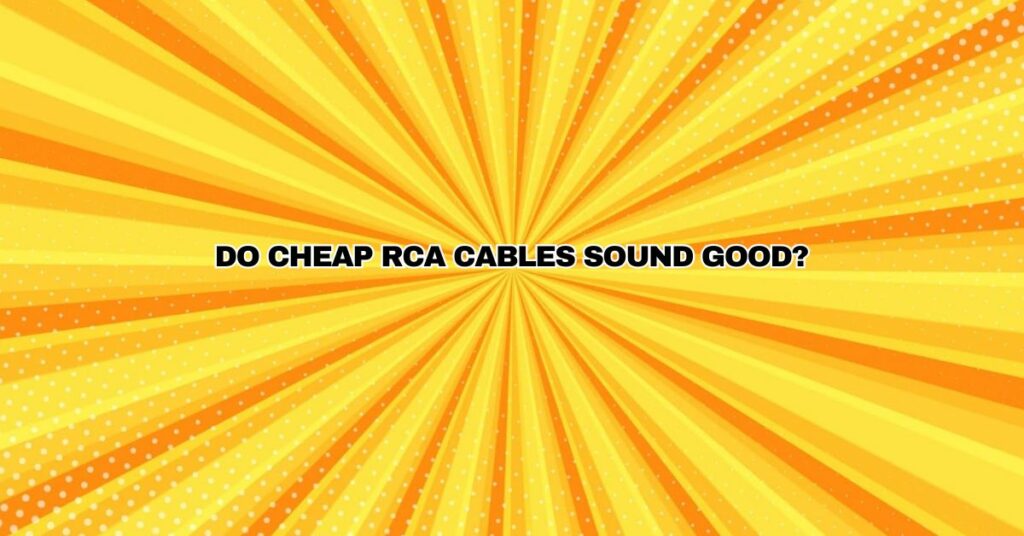In the world of audio and music, every component in your signal chain plays a vital role in shaping the overall sound quality. From instruments and amplifiers to speakers and cables, each element contributes to the sonic experience. When it comes to RCA cables, a common question arises: do cheap RCA cables sound good, or is it worth investing in higher-quality alternatives? In this comprehensive article, we’ll explore the role of RCA cables in audio systems, the differences between cheap and high-quality options, and whether or not you should consider upgrading your RCA cables for better sound quality.
Understanding RCA Cables:
RCA cables, also known as phono cables, are a common type of audio cable used to transmit analog audio signals between audio sources and amplifiers, receivers, or speakers. They are characterized by their red and white (or red and black) connectors and are widely used in home audio systems, home theaters, and studio setups.
RCA cables are unbalanced, which means that the signal is carried through a single wire and a ground wire. This configuration is susceptible to interference and signal degradation, which can affect sound quality, especially over longer cable runs.
Cheap RCA Cables:
Cheap RCA cables are readily available and can be an attractive choice for those on a tight budget. They typically feature basic construction with lower-grade materials. Here are some common characteristics of cheap RCA cables:
- Thin Gauge Wires: Cheap RCA cables often use thin-gauge copper wires, which can result in higher resistance and signal loss, especially over long cable runs.
- Low-Quality Connectors: The connectors on cheap RCA cables may be made of inferior materials, leading to poor contact and a higher likelihood of signal degradation.
- Minimal Shielding: Inexpensive RCA cables may have minimal shielding or ineffective shielding against electromagnetic interference (EMI) and radio-frequency interference (RFI). This can lead to unwanted noise in the audio signal.
- Lack of Durability: Cheaper RCA cables may not be as robust or durable as higher-quality options, making them more susceptible to wear and damage over time.
High-Quality RCA Cables:
High-quality RCA cables are designed to offer superior audio transmission and reduce the potential for signal degradation. They typically feature the following characteristics:
- Thicker Gauge Wires: High-quality RCA cables use thicker-gauge copper wires, which have lower resistance and are better at preserving the integrity of the audio signal over long distances.
- Gold-Plated Connectors: Premium RCA cables often feature gold-plated connectors, which provide excellent conductivity, resist corrosion, and ensure a reliable connection.
- Effective Shielding: High-quality cables employ advanced shielding techniques, such as multiple layers of insulation and metal foil, to protect the signal from EMI and RFI.
- Durability: Premium RCA cables are built to last, with sturdy construction and strain relief features to withstand the rigors of regular use.
The Impact on Sound Quality:
Now, let’s address the core question: do cheap RCA cables sound good? The answer depends on various factors:
- Short Cable Runs: In setups with short cable runs and minimal exposure to potential interference, cheap RCA cables may perform adequately and provide acceptable sound quality.
- Simple Audio Systems: For basic audio systems with low-end components, the difference in sound quality between cheap and high-quality RCA cables may not be as noticeable.
- Critical Listening: In high-end audio systems, recording studios, or audiophile setups, the choice of RCA cables can have a more significant impact on sound quality. Cheap cables may introduce noise and signal degradation that compromises audio fidelity.
- Long Cable Runs: Over long cable runs, the use of cheap RCA cables can result in signal loss and reduced sound quality, making high-quality cables a better choice for maintaining audio integrity.
- Interference-Prone Environments: In environments with high levels of electromagnetic interference, such as near power sources or radio equipment, cheap RCA cables may pick up unwanted noise, negatively affecting sound quality.
Upgrading Your RCA Cables:
If you’re concerned about the sound quality in your audio system and suspect that your cheap RCA cables may be a limiting factor, upgrading to higher-quality cables is a logical step. When considering an upgrade, keep the following points in mind:
- Match Your System: Ensure that the RCA cables you choose match the quality of your audio components and the specific requirements of your system.
- Consider Cable Length: Select the appropriate cable length for your setup to avoid unnecessary signal loss.
- Invest Wisely: You don’t necessarily need to break the bank on RCA cables, but consider investing in mid-range or higher-quality options to strike a balance between performance and cost.
- Read Reviews: Research and read reviews from other users to find RCA cables that have a proven track record of delivering improved sound quality.
In Conclusion:
The quality of your RCA cables can have a direct impact on sound quality, but whether cheap RCA cables sound good depends on your specific audio setup and listening requirements. In basic systems and short cable runs, cheap cables may suffice. However, in more demanding setups, or when dealing with longer cable runs and interference-prone environments, higher-quality RCA cables are a wise choice to preserve audio integrity and enhance the overall listening experience. Ultimately, the decision to upgrade your RCA cables should align with your audio goals and the level of sound quality you wish to achieve in your audio system.


